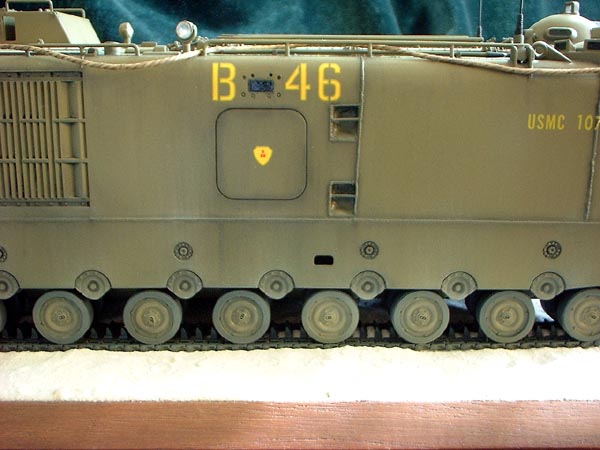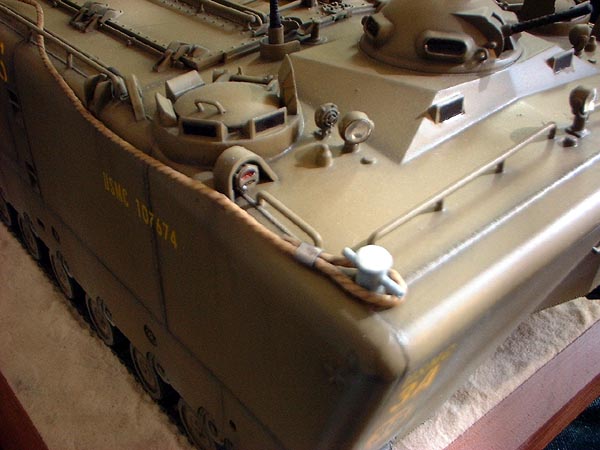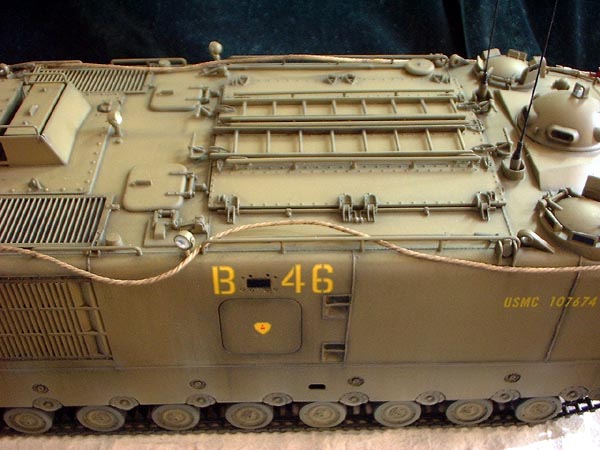|
Another exercise in fun and
relaxation, the US Marine Corps' LVTP-5A1
really makes an interesting miniature to add
to an armor modeler's collection. The basic
model kit is chock full of detail, not
terribly difficult to construct, and
interesting to paint and weather. Like my
M60A2, this miniature was more of a
challenge to paint and finish than to make
into a centerpiece article about model kit
construction. For information on the real
vehicle, and excerpts from the Technical
Manual, follow this link or go to the next
page.
Okay, okay, the inevitable
gripe section. I liked the model kit overall
- though I had nothing to compare this giant
shoe box to in 1:35 scale miniatures. The
level of detail was about all one could ask
for, and though a bit pricey, I had no
reservations about buying one. It actually
has a plus beyond what you get in the box -
it inspires you to build more US Marine
Corps Amtraks. This is a good thing, as the
Amtrak is quite an interesting vehicle
historically.
The engineering of the
model poses a couple of problems for the
novice model builder. The sides of the upper
hull trap the suspension arms calling for
some forethought in completion. I chose to
leave the road wheels off during painting.
These can be added afterwards. Likewise for
the track runs too - as the hull sides hide
the upper runs. I used liquid cement to
shape the track sections. When dried, I
removed them for separate painting and
addition in the end assembly. Naturally, I
completed enough of the upper run to wrap
around the drive sprocket and idler wheel. I
left these parts free to rotate to
facilitate adding the upper runs. Once in
place, I used a pinpoint of superglue to
lock them in place and completed adding the
rest of the track run.
Secondly, the model kit
engineers designed the upper hull parts to
go together in sections - perhaps to best
preserve that nice weld bead detail that
adorns the real Amtrak. However, the
resulting seams between the parts must be
filled and sanded away as they are not
present on the actual vehicle. Not too
difficult of a problem, except for the sheer
length of the seams and relative flexibility
of the plastic. If you sand too hard, you'll
pop a new seam. Also, if you handle the kit
roughly, you run the risk of opening a seam.
Sanding too aggressively destroys the
contour around the 'shoulders' of the Amtrak
too. Patience is called for here, and slows
down completion somewhat.
Other than that, this is
the best paperweight I've ever had! It's one
of the biggest models in a collection -
dwarfed only by a Dragon Wagon or a
Bridgelayer. It isn't dainty or subtle, but
it is a cool miniature.

|




|